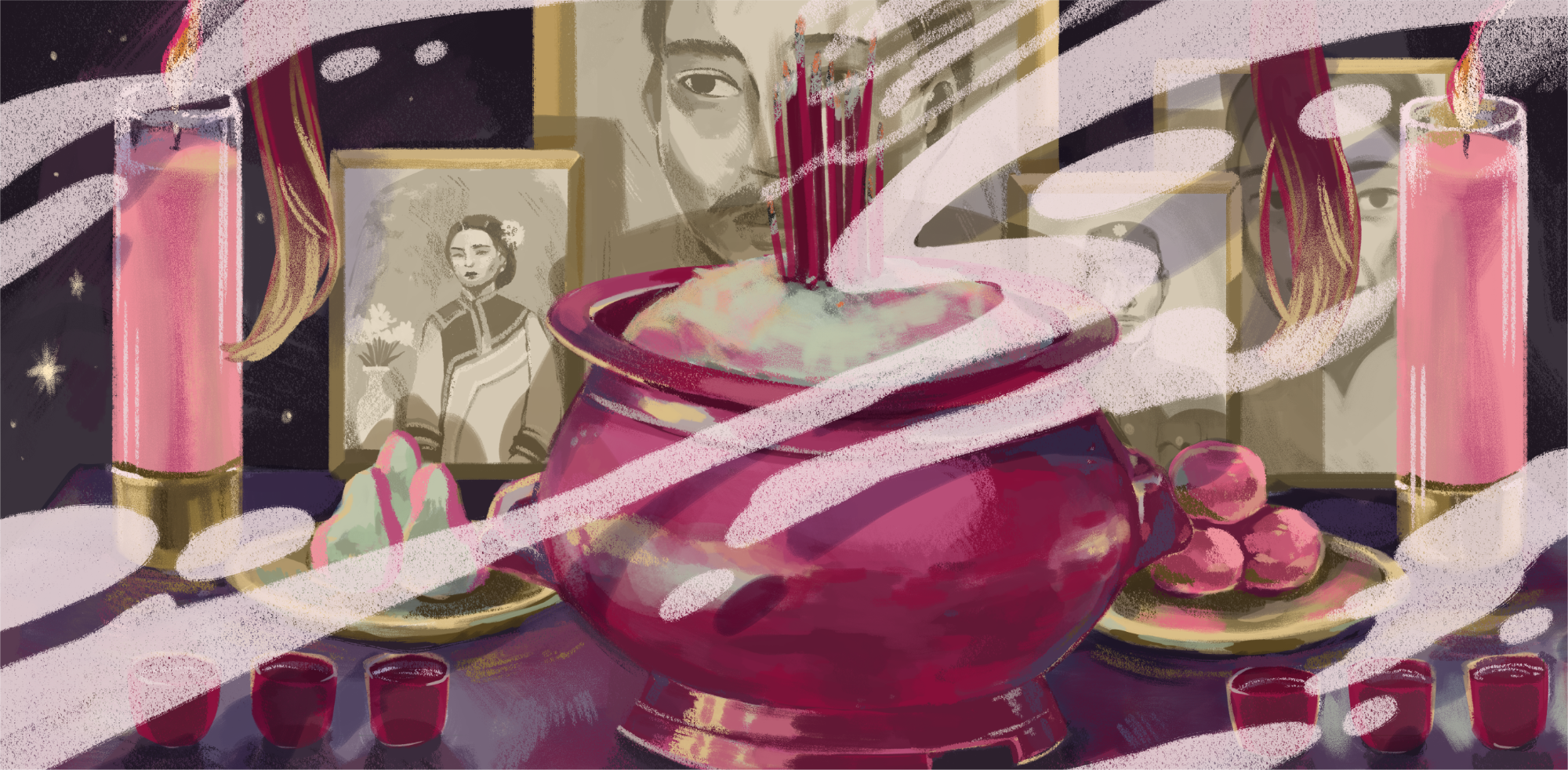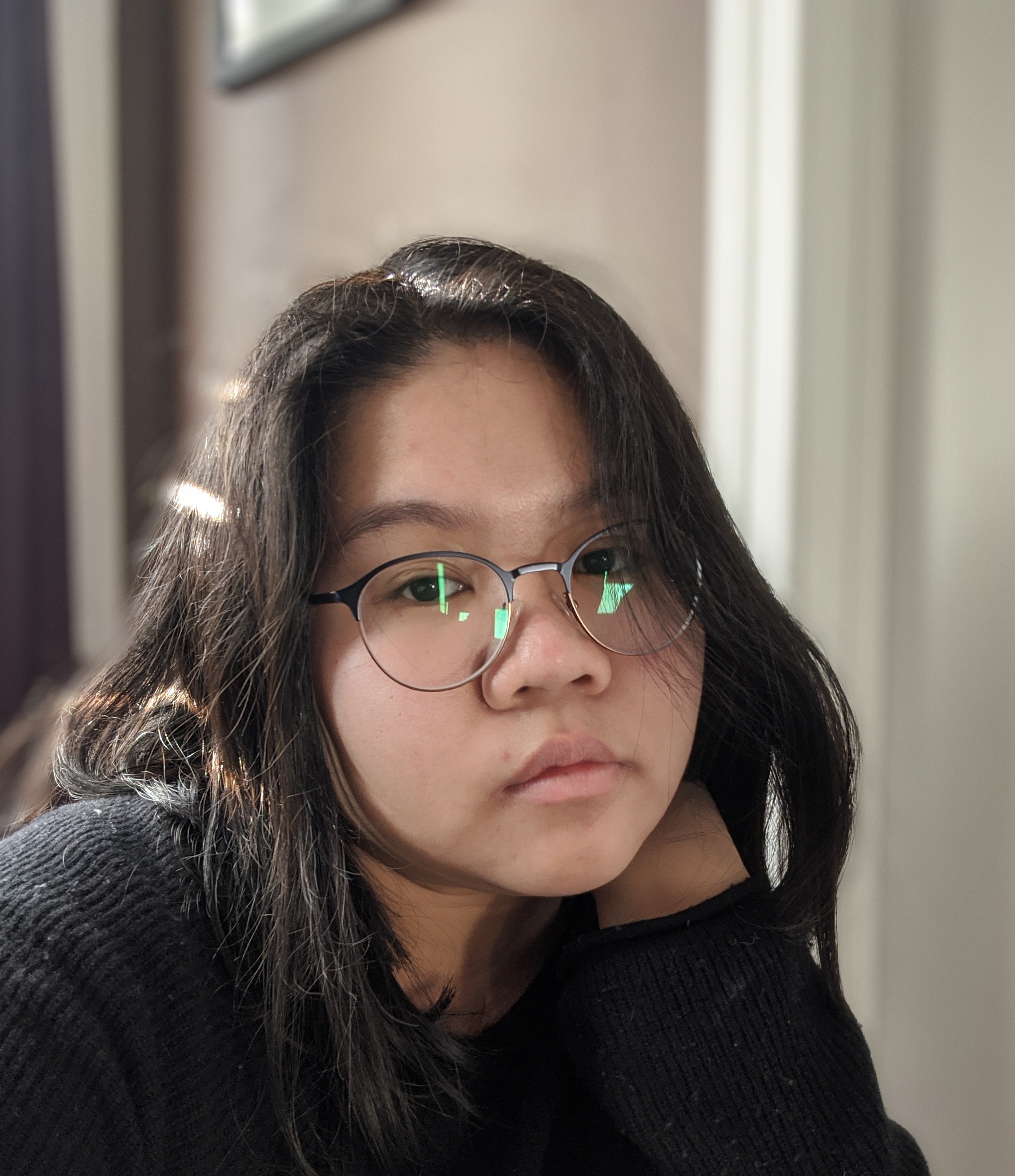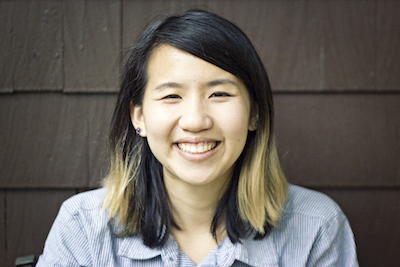Sun, Moon, and Wretched Star
by Ashley Deng
Illustrated by Shaina Lu | Edited by L. D. Lewis
Copyedited by Chelle Parker
June 2020
Willow’s family thanks the dead with food. They revere them with gifts, a mix of clementines, rationed chicken on rice, and incense, before an altar filled with portraits and covered in scrolls. She appreciates the beauty of the calligraphy though she can’t read its words, and she’s never asked about the people in the pictures. They take up this shed, so many thousands of kilometres away from their homeland; obscured by the shadows cast in the candlelight. Portraits of men and of women with shaven heads and long, braided queues.
There’s a woman with a hairpiece, flowers adorning it, and a man in military uniform, a blazing sun on the brim of his hat. Their faces are frozen in black and white, wearing the styles of a culture washed away long ago. She’s heard her parents refer to them by familial titles; whispers of the lives her ancestors lead, of aunts and uncles who died in war and revolution. Willow assumes this is who sits before her.
“Treat them well,” says her mother. She’s never told Willow why.
The altar sits nestled away in the back of a shed at the edge of their yard; the trees of the forest threatening to enter into the ventilation holes near the roof. Willow takes one last look at the altar and bows before she leaves it, swirls of incense still trailing after her.
It’s fall, and the world is tinged with slowly-falling leaves and homemade mooncakes. Her family makes everything here in their little corner of nowhere. They make do with the ingredients they have and, though she’s never known them, she longs for the flavours her family describes: goji and young almond slices, red bean paste and lotus seed, star anise and preserved Chinese white olives. Her grandmother reminisces about the fermented soy and the oyster sauce of her childhood while she pounds away at their make-do filling of red kidney beans sweetened with sugar instead of red mung or lotus seeds. She tells Willow of the teas in China – of the floral of jasmine and the body of gukpoh.
It’s Mid-Autumn Festival, and they hang their homemade lanterns on the tree branches that crisscross their yard in a celebration that was, as far as she knew, unknown to the world around her. At night, Willow watches the warm lights swinging in the cold Canadian wind and waits for the last of the candle fire to go out before heading to sleep.
Mornings in her household smell of steamed rice and homemade cured sausage. Her grandparents prepare as much at home as they do at the restaurant – “plainer” food for the restaurant while the pork congee bubbles away for breakfast. Willow carries those smells with her to school despite bringing a sandwich of ham and cheese, and hides her packed mooncake from the snide glances of her classmates.
One of the newer girls, a prim and proper Christian girl with her blonde hair in tight braids, wanders over to Willow’s desk and stares a little before opening her mouth. Willow remembers her name — Esther. She moved here at the beginning of the school year and had fit in with the others faster than Willow ever could.
“You don’t go to church, do you?” Esther accuses.
Willow takes in her blonde hair and blue eyes, her freckles that adorn the bridge of her nose, and slowly forms a “No.” The question is a trap. It’s always a trap.
“You’re the first Oriental I’ve seen, y’know. I’ve never seen you or your family at church, so I had to ask. My mom said you might be communists.” The girl leans in close and Willow can feel the eyes of her friends on her. “She said we could only be friends if I knew you weren’t a God-hating communist.”
Willow closes her paper lunch bag around her mooncake, almost sensing what this girl would say if she caught her. How dare she celebrate something so unchristian? “My family left because of the war,” Willow replies, her lips curling in distaste. She watches Esther’s blue eyes run circles trying to read her.
Esther turns to her friends for a nod of approval and says, “Well, we’re gonna be keeping an eye on your restaurant. Dad says he’s seen Orientals cut up stray cats for their food but Mom thinks he should give your family a chance before makin’ accusations.” She grins as she says this, as if savoring the malice in her father’s words. Willow’s heard this enough times, endured it through all eight grades of her schooling so far.
And before she can tell Esther to leave her alone, the little white Christian girl turns on her heel and reconvenes to her friends in a small cacophony of whispers.
Willow brings her mooncake to her family’s restaurant that day straight after school. She’d asked once or twice if she was old enough to help, but her parents had pulled her aside and refused to teach her how to cook. “Focus on school,” they’d said. “You’ll do better than the restaurant.”
So Willow watches from the back with her homework as the white people of her town order from the curated list of so-called Chinese dishes. Her Pohpoh takes a rest in the kitchen, sipping her warm water while tending to a pot of noodles as they come to a rolling boil.
“Your grandfather learned to make these before the war,” she says. “We were lucky he knew how to pull noodles. It used to be, you had to go to a noodle-maker every time you wanted them. The people here don’t know how lucky they are. These traditions had to be passed down.”
Willow, hesitant, asks a forbidden question: “Were we with the communists?” She isn’t entirely sure how to say communist in Cantonese and resorts to asking in English. And then she switches back. “Someone – a girl in my class – asked me about it.”
Her Pohpoh catches her eye. “Tonight, when you go home, tell me if you see a star among the altar.”
Willow takes the box of matches to the altar by herself. Winter’s coming – she can feel it creeping into the wind. In Canada, she’s always known cold and winter and quiet. But her parents grew up in the warmth of the south of China, and they’d told her of their first experiences with snow, that it reminded them of the war. That soot from the destruction fell from the skies during raids. They don’t talk much else about the war; the details have been buried under secrets and half-lies.
She lights the candles and incense at the altar, smoke wafting up and out.
Amidst the smoke and the candlelight, Willow searches for a star. The wind batters the side of the shed and the smoke shifts a little, a new scene dislodged from the candles. It smells of florals, of summer, of ash. She frowns some, takes a step closer. Amongst the faces, she only finds a sun. The man before her wears a military uniform, his portrait not in black and white but in tones of sepia. She can’t read the inscription beneath him, but he stares beyond her, past the camera and over her shoulder. Even in a photograph, she can’t meet his eyes.
When Willow looks up, the shed is gone.
She stands knee-deep in a field flooded with water, mountains jutting like fingerlings around her. The air she breathes is dense and humid, filled with sweet flowers and muddied earth. In the distance, a red flag flies before an army. On it, in gold, she can see a hammer and sickle – and a star.
The smell of incense wafts back past her and she feels a hand take her arm. Her Pohpoh looks at her with concern as the shed and the altar slowly fade in around her.
“What was that?” Willow asks. “Where was that?”
Her grandmother stands some incense in the pots and lights them again to fill the room.
“I told your parents they made a mistake in hiding this all from you. They couldn’t expect that you’d only be satisfied with half of it,” she says, shaking her head. “We tried to preserve what we could of our old ways, our traditions, our magics. This is all we were able to keep. But it’s enough for the spirits to join us here. ” She stands, lit by the warmth of candlelight and smoldering incense, smoke like ghosts in their wisps, watching over. “And — sometimes — the ancestors want to share their secrets.” Here she smiles. “I think maybe you may have seen a glimpse of our homeland.”
Willow searches for the traces of the scene in the incense, for the florals and the humidity. Her mind swirls with the prospect of learning the ways her parents want her to ignore. Here, at the edge of a forest in rural Ontario, in the shadows of the churches and the white Canadians that distrust her family so.
“They don’t want it to hold you back,” says her Pohpoh.
Willow grins. “It won’t. It won’t.” She doesn’t want to be like the white people of her town.
Her grandmother smiles. “Then we’ll teach you what we know.”


